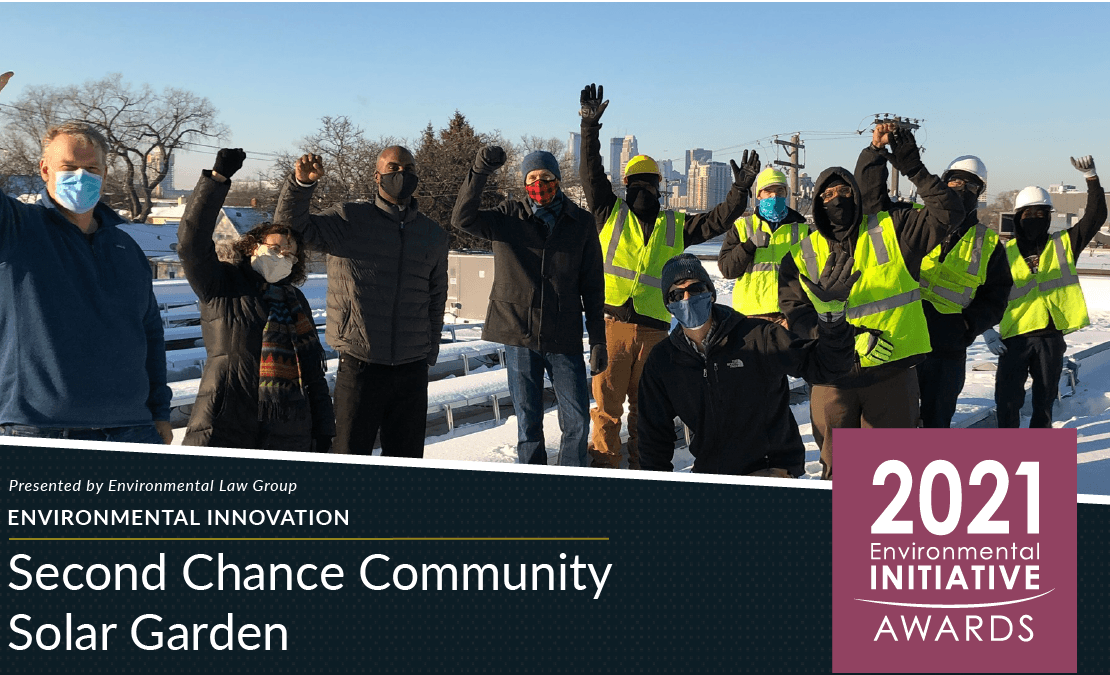Second Chance Community Solar Garden gets ready to shine

The Second Chance Community Solar Garden was recognized in May 2020 as an environmental innovator for its development in local energy. I recently sat down with Kyle Samejima, Executive Director of Minneapolis Climate Action, to talk about how the project is going and learn more about its impact. Her enthusiasm for this work is contagious and brightened my day.
What has happened in six months of the garden being live?
Well, this wasn’t completely unexpected, but the garden is not live yet. We are still in the interconnection application process with Xcel, the array has been installed for about a year but it’s a slow process of getting those last few things in place. Subscribers have been very understanding as we communicate with them and navigate this process. We’re hoping to be live in the next couple of months.
In the meantime, we have other exciting things going on with community solar. Our North High School Community Solar Garden is at a similar stage, the array is in and we’re going through the interconnection application process. Both gardens we really see as pilots, you know, projects where we really dive in and deal with the learning curve in the process of starting community solar gardens. We’re doing things right to create safe and successful gardens, but there isn’t time to wait on starting these projects. Time is of the essence.
It’s been an amazing experience with incredible community-building, dialogue, and discussion, along with incredible challenges. We must consider how people can pay for their subscriptions, how we align with energy assistance, and how we keep the benefit that people get at a good rate. It’s an advocacy challenge and an opportunity to keep community solar gardens as close to the original intent of the legislation as possible. This type of garden is a model: locally operated, installed with local labor, and barrier-free participation where subscribers can participate with no money down whether they rent or own. We don’t check credit scores and there’s no minimum income. We’re very proud of this model and we want to expand it across the city.
Are community members becoming experts on solar power and community energy?
Yes, and there is still so much work to be done around that. At the heart of this work is our desire to create awareness and connect to people, you know, what’s behind the light switch? And when we talk about things like environmental justice, who’s most impacted by climate change, who has the highest rates of asthma in the city, I went in with an idea that these things are common knowledge and I found that they just aren’t. It shows how disconnected we’ve become from our systems, whether it’s food, water, or energy. So, we’re working to create that awareness and knowledge within communities, while really paying attention to the needs of the community and what they bring in terms of resiliency and experience.
Is the solar garden replicable?
Absolutely, and we are working with others to design and build their own. We’re currently in the midst of a project in the Central and Bryant neighborhood in South Minneapolis. There is a dialogue around creating a resilience hub at Sabathani Community Center and we think that including a solar garden would be a great resource in that resilience hub. We’re really looking to create a space where the community gathers for music, art, and storytelling while also engaging with energy and environmental justice.
Is there anything else you’d like to share?
There’s this perception that if you’re low income, a single parent, or struggling to make ends meet you don’t have time to think or care about climate change. Those burdens are real and deep and can be damaging, but at the same time it’s a myth that low-income individuals don’t care about climate change. We have faced very little resistance. When we look to communities for what they want, even in places like Central and Bryant where there is a lot going on and a lot of issues to be addressed, we find people who want the asset of community solar in their neighborhoods.
How can our readers support this work?
Yes, we need to hire more people, there is too much good work to be done. Minneapolis Climate Action has had the good fortune and put in the hard work to create trusted partnerships all over the city. We need more people power—all of our partners do. We need people on the ground building relationships and starting dialogues based in trust.
Nominations for the 2022 Environmental Initiative Awards will open on Wednesday, Jan. 19, 2022. The Environmental Initiative Awards recognizes those working in partnership at the nexus of a healthy environment, a prosperous economy, and an equitable society.